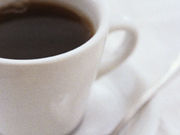Caffeine's Jolt Can Sometimes Be Short-Lived
Stimulant effect diminished after days of insufficient sleep, study finds.
Caffeine no longer improves alertness or mental performance after a few nights of sleep restriction, according to a new U.S. military study.

"These results are important, because caffeine is a stimulant widely used to counteract performance decline following periods of restricted sleep," said expert.
"The data from this study suggests that the same effective daily dose of caffeine is not sufficient to prevent performance decline over multiple days of restricted sleep," expert said.
The study included 48 healthy volunteers whose sleep was limited to five hours a night for five nights. The participants took either 200 milligrams of caffeine or an inactive placebo twice a day. (An average cup of coffee has 95 milligrams.) In addition, the volunteers were given mental skills tests every hour while awake.
For the first few days, those who took caffeine had better test results than those who took the placebo. But that was not the case over the last few days of sleep restriction, the researchers found.
"We were particularly surprised that the performance advantage conferred by two daily 200-milligram doses of caffeine was lost after three nights of sleep restriction," expert said.
Adults should sleep seven to eight hours each night, according to the U.S. Centers for Disease Control and Prevention.
Source: U.S. Dept. of Health & Human Services
- 267 reads
Human Rights
Ringing FOWPAL’s Peace Bell for the World:Nobel Peace Prize Laureates’ Visions and Actions

Protecting the World’s Cultural Diversity for a Sustainable Future

The Peace Bell Resonates at the 27th Eurasian Economic Summit

Declaration of World Day of the Power of Hope Endorsed by People in 158 Nations

Puppet Show I International Friendship Day 2020

